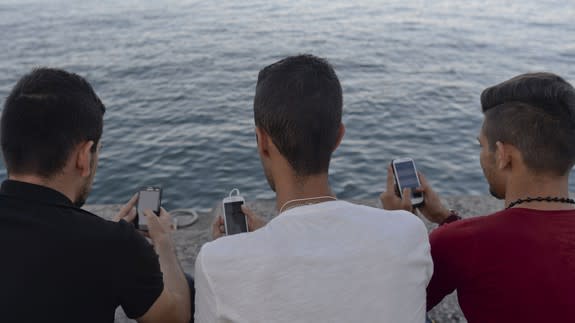This app connects refugees to volunteer translators via Facebook Messenger

Language barriers can make a refugee's long journey even more grueling, but a new app is getting them the translation help they need — wherever they are in the world.
Tarjimly, which launched Tuesday, connects volunteer translators to refugees and immigrants who need to speak with doctors, aid workers, legal representatives and other crucial services in a new country. It acts as a Facebook Messenger bot, allowing for easy, real-time translations on any smartphone.
SEE ALSO: 5 crucial online resources that help immigrants learn their rights in airports
When they need help, refugees and immigrants just need to message the bot and choose their language, and Tarjimly will pair them with an appropriate translator.
Volunteers across the globe can register as translators through an online form, designating the two or more languages they can write and speak at a "colloquial level." The translators will then receive requests in the form of a Facebook message.
More than 1,100 people have already signed up as translators this week; the team behind Tarjimly expected only 50.
The app is still in demo mode, allowing the team to build its database of translators while people get used to the interface. The only demo currently available is in Arabic, but Pashto, Farsi and Urdu will be added next, as well as other languages. Tarjimly aims to start connecting people with translators in the coming weeks.
The bot is tackling a very real problem: There are more than 21.3 million refugees around the world, half of whom are children, all navigating new countries. And while the app is useful at any point throughout the ongoing global refugee crisis, it also comes just days after President Donald Trump signed an executive order barring people from seven Muslim-majority nations from entering the United States.
The timing isn't lost on Tarjimly's creators. The group of three friends, all MIT graduates, are Muslim Americans who have family and friends directly affected by the immigration ban. They had previously volunteered at refugee camps in Europe, and found that about 90 percent of their time was spent just doing translations. Communication was often a matter of life and death.
"It was a huge problem," said Tarjimly cofounder Atif Javed. "We wondered if we could leverage the millions of Arabic and English speakers, and the millions of Farsi and English speakers, around the world and give them an opportunity to actually mobilize and help out."
Now living in Palo Alto, California, and working in the tech industry, the team wanted to do something that helped people through the use of technology.
In a widely shared Facebook post, Javed said he's seen increased demands for translators to help immigrants over the past week.
"While Trump bans immigrants and refugees, technology can help us stand together," Javed wrote. "Tarjimly can be a tool to fight this #MuslimBan and refugee crisis, giving average people a way to help those most vulnerable. A chance at real impact — anonymized and at your availability."
For privacy and security, the only personal information Tarjimly shares are first names. If there's interest, Javed and the team may integrate a feature that helps people share contact information with each other.
The only clear vetting system in place for translators, in terms of signing up, is turning the demo into a test. The app will automatically score how well someone can perform, and the best 50 to 100 translators will get access to the service first. There will also be a rating system in place, helping to weed out bad translators and put more focus on highly rated translators.
Refugees and immigrants have the power to end a conversation at any time, and message Tarjimly to get an immediate connection to a different translator. The team is also considering implementing a feedback system, and may "monitor randomized conversations for quality assurance," according to the website.
Tarjimly isn't necessarily the first service of this kind to cater to refugees. There are various apps on the market to help refugees while they travel, as well as Facebook groups like Rapid Response Refugee Translators, which employs volunteers to translate documents and conversations in real-time.
But Tarjimly provides an easy and direct pipeline for refugees and immigrants to find translators, and could help fill gaps. The creators have made bots for Facebook Messenger before, and knew it could help people register easily and reach a lot of people quickly.
"When you have Facebook and different technology platforms, you really open the aperture of access," Javed said. "You can't get people to adopt separate apps. You have to use existing platforms."
The team wants to do a slow rollout in order to create the most responsible product. After they create a database of translators, they'll start testing it with refugee groups and gather feedback. If everything goes well, they'll open it up more.
Javed said he's received at least 30 emails from people interested in the app so far, including aid workers wanting to implement it among their colleagues. He and the Tarjimly team are interested in partnering with refugee organizations, and making sure the bot gets into the hands of those who need it most.
He also hopes the app serves as inspiration for people to take action, and use their own skills to create change.
"People feel very disempowered ... given the results of the election," Javed said. "It's important for everybody to use whatever agency they have. If you have something you're really good at, you need to start actually leveraging it to help solve the problems."

 Yahoo News
Yahoo News 